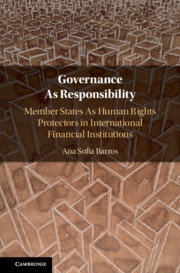 Governance As Responsibility
Governance As Responsibility Book contents
- Governance As Responsibility
- Governance As Responsibility
- Copyright page
- Dedication
- Contents
- Foreword
- Preface
- Acknowledgements
- Abbreviations
- Introduction
- I The Relationship between International (Financial) Institutions and Their Member States
- II Accounting for the Governance Role of Member States of International Financial Institutions in the Regime of International Responsibility
- III Member States As Human Rights Protectors in International Financial Institutions: Matching Governance with Responsibility
- Conclusion
- Bibliography
- Index
II - Accounting for the Governance Role of Member States of International Financial Institutions in the Regime of International Responsibility
Published online by Cambridge University Press: 28 June 2019
- Governance As Responsibility
- Governance As Responsibility
- Copyright page
- Dedication
- Contents
- Foreword
- Preface
- Acknowledgements
- Abbreviations
- Introduction
- I The Relationship between International (Financial) Institutions and Their Member States
- II Accounting for the Governance Role of Member States of International Financial Institutions in the Regime of International Responsibility
- III Member States As Human Rights Protectors in International Financial Institutions: Matching Governance with Responsibility
- Conclusion
- Bibliography
- Index
Summary
"Chapter II critically analyses the application of secondary rules of international law in the context of member State participation in international financial institutions. It begins by looking into the evolution of discussions on member State responsibility, culminating in the regime devised by the ILC in Part V of the ARIO. In this exercise, it sheds light on how -member States’ governance role was acknowledged all along. Based on identified insufficiencies in the ARIO in that respect, the Chapter subsequently examines whether member State governance may rather lead to member State responsibility for their own wrongful acts performed in an institutional setting. It thus concentrates on attribution rules. Inspired by contexts where member States act as implementers of institutional decisions and as troop contributors, the focus is placed on their participation in the representative organs of international financial institutions. Firstly, the international legal status of Executive Directors is explored, to demonstrate that, despite the duality inherent in their role, they can be considered State organs. Secondly, attention is brought to the dynamics of decision-making, which attest to the notion that voting emerges as a corollary of the power of sovereign representation, and should therefore be deemed conduct attributable to the State.
Keywords
- Type
- Chapter
- Information
- Governance As ResponsibilityMember States As Human Rights Protectors in International Financial Institutions, pp. 60 - 132Publisher: Cambridge University PressPrint publication year: 2019


